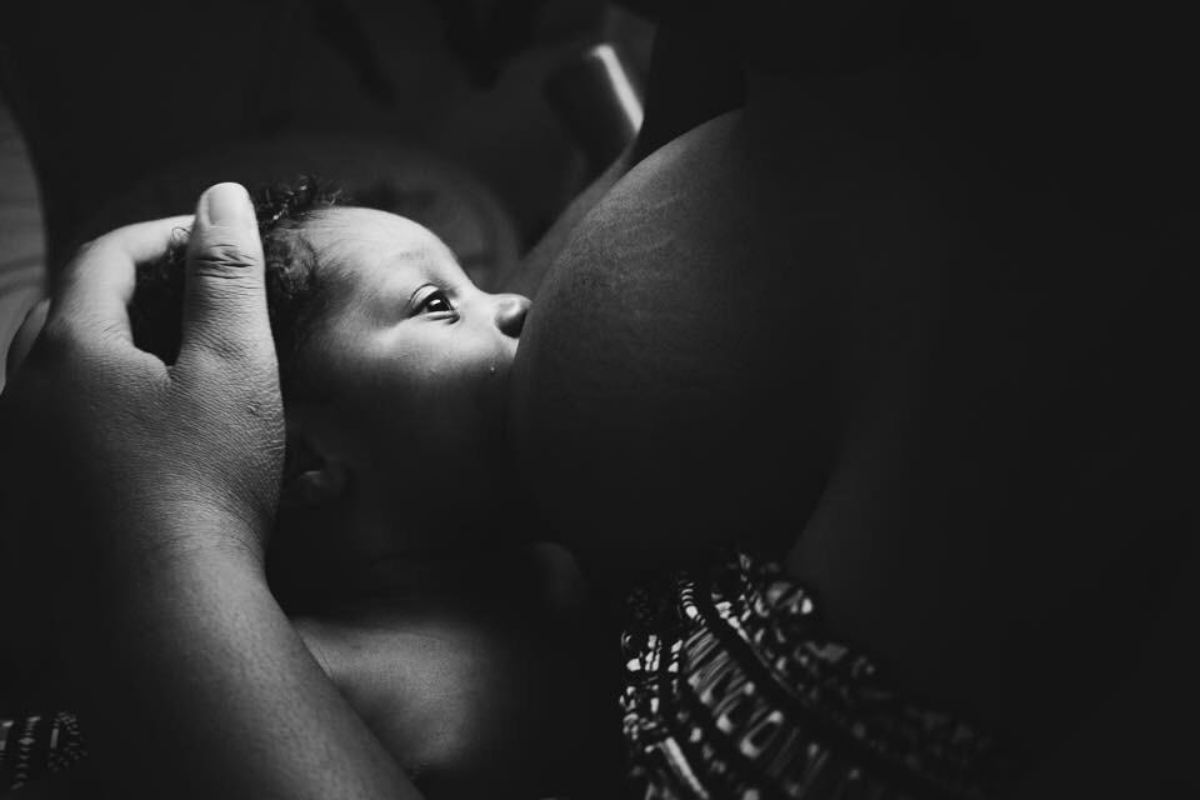Breastfeeding is a beautiful natural experience, an economical and eco-friendly means of feeding baby and it’s one of the first ways that mothers and babies develop a close bond. Though the process sounds easy in theory, the actual road to successful breastfeeding can come with bumps—and some moms are at greater risk of missing out on the support needed to overcome them. Mothers of color are at a very specific and pernicious disadvantage, one of several factors contributing to historically low breastfeeding rates in Black communities.
It’s the importance of bridging this gap that brought maternal health experts Kimberly Seals Allers, Kiddada Green and Anayah Sangodele-Ayoka together to form Black Breastfeeding Week seven years ago. The annual event focuses on the essential mission of ending disparities in care access and education for Black mothers and their babies, giving them a better chance at the healthy life they deserve.
There are five issues central to the campaign’s mission:
1. Disproportionately High Infant Mortality Rates
The mortality rate of Black babies is twice as high as that of white babies—in some areas, such as Florida, Black babies were found to be three times more likely to die in the hospital than their white counterparts. Also deeply troubling are the findings of a recent study, which discovered that Black infants are more likely to die when treated by non-Black doctors. Treatment before, during, or after birth increased survival rates by 39-58 percent.
A part of the reason for these high death rates are health and birth issues common to the community, such as premature birth, low birth weight and related complications. Babies born small, sick, or premature have the greatest need for the immunities provided by breast milk. And so considering that on average babies who are breastfed for 3 months or more have a 38 percent lower risk of death in their first year (compared with babies never breastfed), scaling up breastfeeding in Black communities may decrease rates of infant mortality by even more.
2. Greater Risk of Diet-Related Illness
Predisposition to certain illnesses in African American kids is statistically high, and occurrences of diabetes, asthma, obesity, SIDS, and chronic upper respiratory issues are common. According to the World Health Organization, breastfeeding can help to reduce the risk of all of these issues in babies and children but, tackling this begins with eliminating the obstacles that stand in the way of successful breastfeeding for Black moms.
3. A Lack of Diverse Lactation Pros
Breastfeeding is very personal, and any mom who looks to a lactation consultant for support and assistance will surely seek one who is a comfortable fit with their culture, needs, and personality. That’s not always easy for Black moms, who are faced with an industry that is generally led by white women.
This disparity serves to perpetuate a harmful stereotype about African American moms and breastfeeding, and it often creates a barrier for Black moms who would love support from someone more culturally competent. The addition of more Black women as certified lactation professionals can bring greater diversity and accessibility to the field, allowing mothers and babies of color to more comfortably benefit from desperately needed support and education.
4. Stereotypes and Barriers to Overcome
One root of disconnection from breastfeeding in Black communities hearkens back to the role that women of color played as wet nurses while enslaved. This abhorrent practice frequently deprived Black women of the opportunity to nurture and bond with their own children, thus developing a strong negative association with the act of nursing.
Though this perception seems to ebb further with each generation, multi-generational support and normalization of breastfeeding is a factor in success. Without support and advice from within the family unit, Black moms may feel unsure of how to proceed but uncomfortable broaching the sensitive and personal topic with doctors.
5. Lack of Community Support
Kimberly Seals Allers used the term “first food deserts” to describe communities where there is a lack of support for breastfeeding. This includes a lack of places for new mothers to nurse, supportive organizations and facilities that provide free access to knowledge, and legislation that supports and protects breastfeeding at all times and in all ways. These deficits are especially prevalent in low-income communities, thus disproportionately affecting people of color who reside there.
Black Breastfeeding Week is all about putting a stop to the inequalities that affect the health and well-being of mothers and babies of color. It’s one of many events taking place in the month of August which reflects on both the importance of breastfeeding and the economic and social disparities which prevent all mothers and infants from being able to access its benefits equally.
Neve Spicer is the founder and editor of WeThe Parents: the warm, broad-minded, and inclusive guide to pregnancy and parenting. Having breastfed three kids and having three entirely different experiences, she understands the need for breastfeeding advocacy without shame or judgment. Follow her on Twitter and Facebook.
